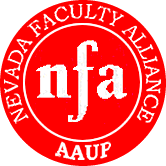This week, UNLV will begin formally the process of curricular program review, with the election by the Senate of faculty representatives to the Ad Hoc Curricular Review committee.
The UNLV administration has committed publicly that this process will follow the provisions of the System Code and the UNLV bylaws -- and therefore will not seek to terminate tenured faculty or seek to terminate untenured faculty or professional staff without proper notification . This commitment is highly significant -- and highly salutary -- precisely because our administration appears to be, in effect, resisting the worrisome trend nationally and in Nevada of university administrations that are engaging in faculty layoffs for explicitly financial reasons without declaration of exigency.
Note as well that the widely circulated list of 20 departments was, as made clear in the covering memo from the Provost, intended only to be a "start" of the process, and not the definitive list of programs to be cut. There is some confusion about the nature of the list, due to solid but imprecise reporting in the RJ; it is not the "twenty most expensive programs," but those with the highest cost per student FTE ratio. Moreover, this is but one of the over two-dozen criteria -- qualitative as well as quantitative -- that are to be used in this process, as per the Program Review guidelines drawn up jointly by Faculty Senate and administrative representatives (PDF) more than a year ago in anticipation of this possibility.
The application of these criteria to programs identified by the Provost, or other programs that Deans might identify for consideration in their own Colleges, will be conducted by a joint faculty-administrative committee, to be chaired by a tenured faculty member. This is the committee whose faculty representatives will be elected at this Tuesday's Faculty Senate meeting (.doc).
Finally, as per the UNLV by-laws concerning Curricular Review (article 19.8), recommendations of the Ad Hoc Review Committee, will be considered by the Faculty Senate Priority and New Program Committee and the full Senate, as well as by Deans and faculties of impacted programs, before final recommendations are made to the President.
It is therefore of the utmost importance that faculty pay careful attention to this process and ascertain accurate information and take full advantage of the opportunities for faculty voices to be heard in this process. The NFA will seek to keep its members, and through them all faculty, informed about the process and the opportunities for input.
With respect to the UNLV program review, the NFA will urge that the process follow these principles :
1. That this will be a "bona fide reasons" of a curricular review and be genuinely "the consequence of the academic planning process" (System Code 5.4.6) and not merely be a form of financial exigency without such being declared by the Board. Financial criteria therefore cannot be the sole, or even the primary, basis for decisions to terminate a Department or program.
2. That all faculty rights as outlined in the by-laws and System Code be respected, including full input from effected Departments be considered during the review process, all "reasonable attempts" be made to place faculty from effected Departments in other units, and all faculty facing termination be granted a right to grieve (ie, appeal) to a separate committee.
3. That the cuts not fall exclusively or primarily on academic programs and that the Ad Hoc committee and other relevant committees and entities -- Faculty Senate, Academic Council, etc -- also consider areas outside of academic programs as well as units within academic programs that are not degree-granting programs. In short, cutting faculty should be a last resort, to be undertaken with the greatest deliberation and sense of gravity.
4. That untenured faculty, especially but not only tenure-track, be given full voice in this process, as consistent with AAUP guidelines, because untenured faculty are "likely to bear the brunt of the reduction" and thus "should participate at the department, college or professional school, and institution-wide levels in key decisions as to the future of the institution and of specific academic programs within the institution."
5. Most importantly, again drawing on AAUP guidelines, "The faculty, employing accepted standards of due process, should assume primary responsibility for determining the status of individual faculty members."
I close with a thought, expressed by one of our colleagues in Engineering last Friday, but which I believe speaks for all of us: "There's nothing we an afford to sacrifice without damaging the university."
Sunday, March 7, 2010
Subscribe to:
Post Comments (Atom)






No comments:
Post a Comment